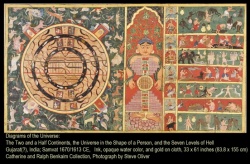Difference between revisions of "Amata"
Jump to navigation
Jump to search
m (Text replacement - "Category:Pali terminology" to "{{PaliTerminology}}") |
|||
| (One intermediate revision by one other user not shown) | |||
| Line 1: | Line 1: | ||
[[File:Ejdv02 p4.jpg|thumb|250px|]] | [[File:Ejdv02 p4.jpg|thumb|250px|]] | ||
| − | '''[[Amata]]''': [[Sanskrit]] [[amrta]] [[Not to die]] = [[Deathlessness]], [[immortality]], is a [[name]] for [[Nibbana]] the final [[Liberation]] from the [[ | + | '''[[Amata]]''': [[Sanskrit]] [[amrta]] [[Not to die]] = [[Deathlessness]], [[immortality]], is a [[name]] for [[Nibbana]] the final [[Liberation]] from the [[Wheel of rebirths]] [[Samsara]], and therefore also from the [[ever-repeated deaths]], since the {{Wiki|unborn}} cannot [[die]]... The [[Deathless State]] or [[nirvana]], so called because those who attain it are free from the [[cycle of repeated birth and death]]. |
{{W}} | {{W}} | ||
[[Category:Buddhist Terms]] | [[Category:Buddhist Terms]] | ||
| − | + | {{PaliTerminology}} | |
| + | {{SanskritTerminology}} | ||
Latest revision as of 12:43, 27 April 2014
Amata: Sanskrit amrta Not to die = Deathlessness, immortality, is a name for Nibbana the final Liberation from the Wheel of rebirths Samsara, and therefore also from the ever-repeated deaths, since the unborn cannot die... The Deathless State or nirvana, so called because those who attain it are free from the cycle of repeated birth and death.
